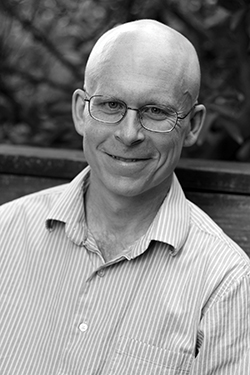Non-Hodgkin Lymphoma Survivor
Poetry Brings Meaning to this Survivor's Journey
 In two years’ time, Brad Buchanan found himself facing an extremely rare T-cell lymphoma, a dangerous case of GvHD and B-cell lymphoma. An accomplished poet, Brad drew on his love of the written word to give him strength. Today, he uses that same approach to help others who are working through illness, disability or recovery.
In two years’ time, Brad Buchanan found himself facing an extremely rare T-cell lymphoma, a dangerous case of GvHD and B-cell lymphoma. An accomplished poet, Brad drew on his love of the written word to give him strength. Today, he uses that same approach to help others who are working through illness, disability or recovery.
After surviving a bone marrow transplant for a rare form of T-cell lymphoma, a routine blood test showed that I then had B-cell lymphoma. Who would imagine being diagnosed with both of these within a few years’ time? I’d not noticed any symptoms of the B-cell lymphoma, and yet the first prognosis given was about a year.
A few weeks after giving me what sounded like a death sentence, my oncologist returned from a conference with some more hopeful news. A leading cancer center on the East Coast was conducting a clinical trial for patients in my very situation: people who developed B-cell lymphoma after a transplant due to the Epstein-Barr virus.
I was amazed to hear about this possibility and contacted one of the doctors running the trial for more information. I learned that the process was both simple and daunting. I would have to fly to the East Coast and stay there for around three weeks while I received the treatment. Since I was blind and would have to make the journey alone (my wife was fully occupied with taking care of our two children), I was hesitant at first. Then I heard the doctor say some magic words: the trial had a 66 percent cure rate.
I thought those were pretty good odds, and so we made plans for me to depart within a week. My parents, always willing to travel, pledged to stay with me throughout the trial, and my wife rented a small apartment for the three of us.
Fortunately, the B-cell lymphoma responded well to an immunotherapy drug administered before I even left for the clinical trial, and little active cancer was visible on a preliminary scan done by the trial’s clinicians. My likelihood of being cured by the trial went up even further.
The trial itself, which consisted of getting three infusions of “souped up” T-cells, was painless and uneventful; I never felt any side effects. In fact, my parents and I found ourselves enjoying the experience of living in a bustling, unfamiliar city with all kinds of dining options. My visual impairment curbed my appetite for sightseeing, but I came home with a newly discovered taste for Korean barbecue.
After four months, I went from being told I was terminal to being told I was cured. And “cure” is not a term oncologists use loosely. To hear that, after two years of treating a rare form of T-cell lymphoma and a very severe case of Graft-versus-Host Disease, was incredible.
It would have been impossible for me to survive this intense experience without the support of my wife, daughters, parents and the rest of my family. My wife was amazingly helpful. From my medical team to caregivers, she found the right people to do the right things at the right time.
Poetry – reciting it, writing it and teaching it – was my other lifeline. Since my teen years, I’ve processed most of my good, bad and indifferent experiences through poetry. This qualified as a “bad experience” right away because I’m extremely squeamish, which made me a terrible candidate to have a blood cancer.
When I suspected I had some form of it, I began writing down my feelings, and it helped immensely. And with all the many medical terms, I discovered a completely new language. Through uncomfortable diagnostic tests, I recited some of my favorite poems and could easily distract myself for an hour or two. It was a relaxing, safe place for my mind to go during otherwise painful and frightening experiences. After an appointment, getting the details down on paper also helped me recap the whole episode and make sense of it. I’ve published a book of poems that I feel captures my two-year journey. It’s called The Scars, Aligned.
Writing was and still is an integral tool in my recovery, one that I can use in the moment to feel better. I want others to feel that same benefit, so I facilitate writing workshops through a cancer center in California for anyone facing an illness or another type of challenge.
I encourage my participants to get their feelings down in any type of writing — journaling, blogging, poetry. I hope you’ll try it. The format doesn’t matter. Simply expressing your feelings in a positive, supportive environment is a key step in accepting your situation and moving toward recovery.


